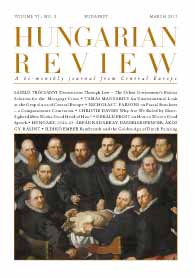AN UNSENTIMENTAL LOOK AT THE GEOPOLITICS OF CENTRAL EUROPE - Part I
AN UNSENTIMENTAL LOOK AT THE GEOPOLITICS OF CENTRAL EUROPE - Part I
Author(s): Tamás MagyaricsSubject(s): Politics / Political Sciences
Published by: BL Nonprofit Kft
Summary/Abstract: Central Europe has always been at the crossroads of history or, to put it less charitably, the region has always been a playground of sorts for major outside powers, especially Germany and Russia (the Soviet Union). Their various attempts over the centuries to impose their political, economic and cultural (value) systems are all too familiar to require any explanation; a look at the map and even the most superficial knowledge of their history or that of any of the Central European states would suffice. Since at least the end of the Second World War, the United States has also been considered to be a “European” power. As such, it exerted indirect influence over the fate of Central Europe during the Cold War, while after the collapse of the Soviet Union and the communist regimes in the region, it became a “Central European power” as well through its role in the Balkans in the 1990s and with the institutional expansion of NATO into the area in the late 1990s and the early 2000s. Of course, one can make a (plausible) case that the US was an ”honorary Central European power” as early as the 1980s when Washington provided vital assistance to the Solidarity movement in Poland, and to the so-called democratic opposition in Hungary (especially at the time of Mark Palmer’s ambassadorship). We could also mention here the activities of the International Monetary Fund (IMF) and the World Bank, as the US is the single largest stakeholder in both financial institutions and practically nothing can be done by them without an American nihil obstat.
Journal: Hungarian Review
- Issue Year: VI/2015
- Issue No: 02
- Page Range: 24-31
- Page Count: 8
- Language: English

